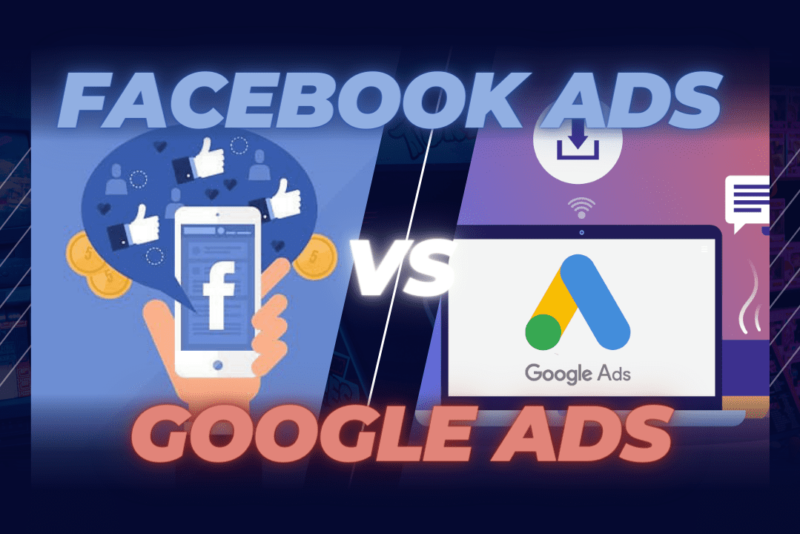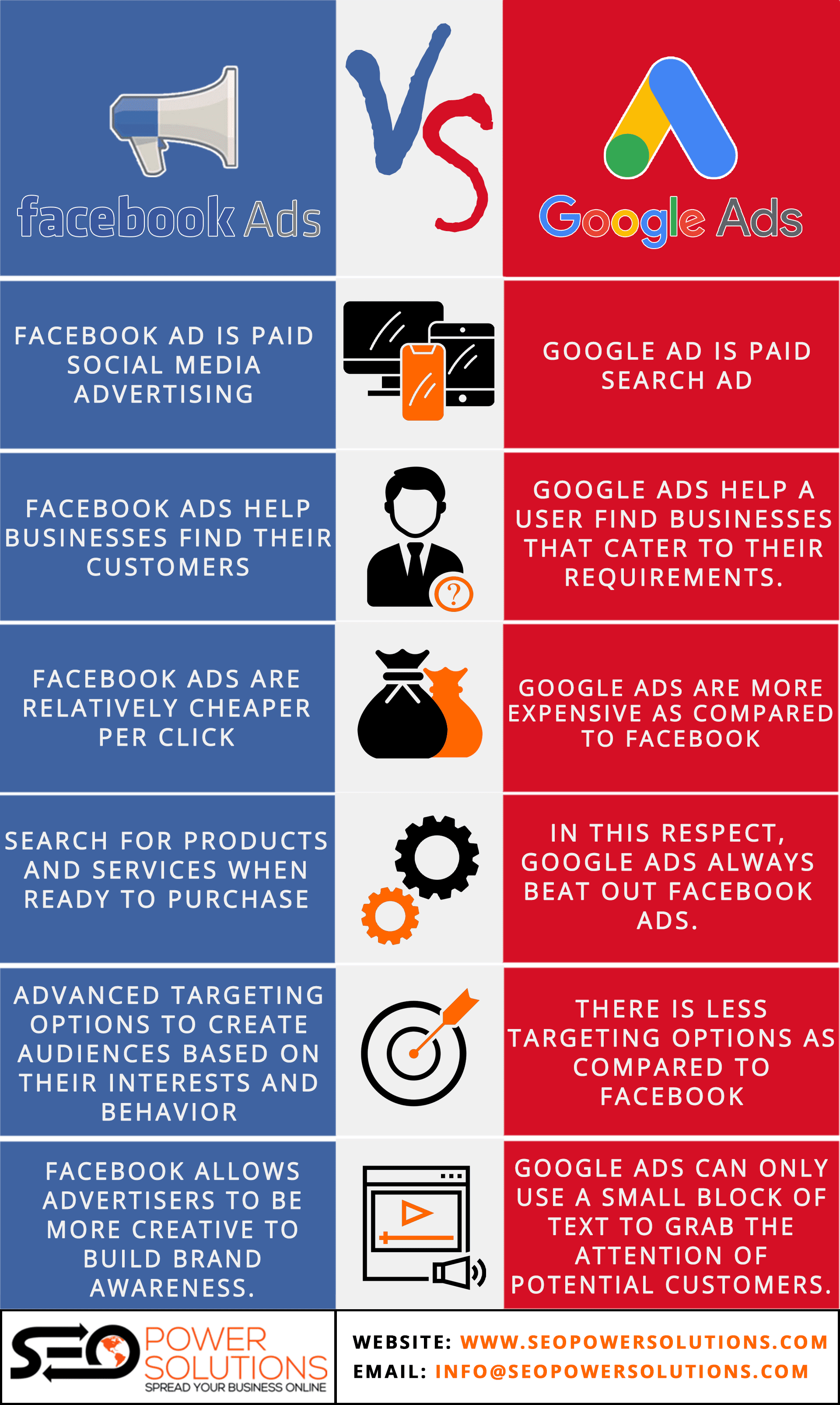Post Published on October 20, 2022
Last Updated on by Sharat Nair
Facebook Ads and Google Ads are the leading pay-per-click (PPC) ad platforms but are different platforms with unique use cases. Often it becomes difficult for businesses to decide which platform is right for their products and services. So for those who still cannot figure out which platform to choose, here is a comprehensive guide for you.

What are Facebook ads?
Facebook ads, also popularly known as ‘Paid Social’ is the practice of advertising on social networks. Facebook ads are best for advertising products and services for targeted audiences who are not actively searching for them but are likely to be interested in them.
What are Google Ads?
Google ads are paid advertising platform developed by Google. In this case, the advertisers bid to display brief advertisements, service offerings, product listings, or videos to the web users. Google ads are placed in the results of search engines, mobile apps, and videos.
If you want to embed this infographic on your website then please copy and paste the below code on your website.
<img class="aligncenter size-full wp-image-58955" src="https://www.seopowersolutions.com/wp-content/uploads/2023/01/Facebook-ads-vs.Google-Ads.png" alt="Facebook ads vs. Google ads" width="1920" height="3210" />
When to use Facebook Ads?
Businesses can use Facebook ads to increase awareness of their brands and products or services. The advertisement is for those audiences who have not heard of the brand before. Therefore Facebook allows advertisers to introduce their offerings and benefits to the desired target audiences with compelling videos, images, and text ads.
What are the benefits of using Facebook Ads?
Research shows that paid channel offering the highest ROI is Facebook. Let’s find out the reasons-
- The ‘lookalike audience’ feature is a user persona that shows ads to those audiences who match your description.
- Facebook ads can seamlessly blend with videos, images, and other visual content in the user’s News Feed to convey aspirational messages.
- Advertisers can target vast global active users of Facebook with potential granularity.
- As advertisers can reach more users, they can get a better click-through rate through Facebook Ads.
- Facebook provides some of the best tools to advertisers for creating meaningful, relevant, and engaging ads and receiving incredible ROI (Return on investment).
How does a Facebook ad work?
Ads are created using the Facebook Ad Manager Platform. It is displayed to a target audience defined by user demographics, location, interests, behavior, and Facebook engagement patterns. As a part of the ad creation process, there is a set ad budget, ad placement, and ad run time. Since Facebook users do not actively seek products and services, Facebook provides advertisers with certain targeting factors age, gender, income, and interests – that align closely with the ad content.
Once the ad is comprehensively crafted, Facebook ads capture the latent users’ interests, increasing brand awareness and generating sales.
When to use Google Ads?
Businesses use Google ads to advertise their products and services to people who want and need them and are actively searching for those products or services. Google ads primarily target users in their buying phase.
What are the benefits of using Google Ads?
- No other search engines can offer the potential audiences as Google can. The vast potential source of prospective users makes Google an excellent advertising platform, especially for digital marketers.
- Remarketing is easier with Google ads. You can now re-engage users who didn’t complete their previous purchases after adding products to the shopping cart.
- Simple interface and features like search term report, ads editor, and auction insights make it easy for advertisers to build, launch and track their ad campaigns.
- Features like ad extensions, site links, location targeting, user reviews, shopping ads, and a host of other features enable advertisers to offer customized ads. Google’s new ad formats are tailored to the unique need of the specific type of business.
- ROI in the case of Google ads depends on how relevant the ad is to the user. Google ads reward high-quality, relevant, and optimized ads above all other factors.
How does Google Ad work?
To create Google ads, advertisers sign up for a Google Ads account, and then add text-only ad copy and keyword targeting information. Ads are created on the Google Ad Manager interface. Advertisers build text-based ads by creating Campaigns, Ad Sets, and Individual Ads with a headline and descriptions. Google ads appear at the top of search results pages based on keywords searched by users and how those keywords are aligned with the ad content.
Unlike Facebook ads, Google ads are triggered by keywords and search terms. On Google, users actively search for products and services, or answers to specific questions. If they can be provided with the exact information they are looking for, they are more likely to purchase your products or services and engage with your brands.
Facebook ads vs. Google ads:
- Google ad is paid search, while Facebook ad is paid social media advertising.
- Facebook ads help businesses find their customers. On the other hand, Google ads help a user find businesses that cater to their requirements.
- Facebook ads are relatively cheaper per click, unlike Google ads.
- People tend to search for products and services when ready to purchase them. In this respect, Google ads always beat out Facebook ads.
- Unlike Google Ads, Facebook has advanced targeting options to create audiences based on their interests and behavior.
- The ad format of Facebook allows advertisers to be more creative to build brand awareness. On the contrary, advertisers using Google Ads can only use a small block of text to grab the attention of potential customers.
Which platform is best for you?
Consider the following factors before deciding which of these above-mentioned platforms is right for your business-
- Client’s campaign goal
- Client’s industry
- Client’s set audiences
- Stage of the buyer’s journey
- Advertising budget
However, harnessing the power of both Facebook ads and Google Ads is an effective advertising strategy. Both platforms are the best-value online advertising solutions in recent times.

